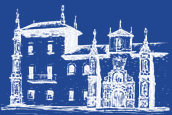About This Journal

TITLE
We wanted our journal to have a Basque name that is easily pronounced, and that conveys what makes this journal possible. BOGA, a Basque word for rowing, integrates our logo of the "estropadak" or the Basque row boat and thus the concept of people sharing in the effort to promote BASQUE STUDIES. Boga is also the name of a Basque language learning software program of HABE of the Basque government, and the cross-reference is exactly where we want to be, as Basque Studies is also about the promotion of learning Basque. CONSORTIUM derives from the Latin consors which means 'partner'. Basque Studies at Boise State University is committed to the forging of learning links, via collaboration with other institutions and individuals in a viable network to mutually support efforts in Basque Studies. Finally, this JOURNAL is a means to disseminate original scholarly works to encourage interaction among academics from various learning traditions.
AIMS
This journal aims to be a part of the long-standing tradition of Basque higher education as symbolized by the Basque Country’s first university built in Oñati, Gipuzkoa in 1548 (incorporated into our website theme). The town of Oñati also holds additional significance for Boise State University’s Basque Studies Program because it served as the first location for the studies abroad program in the Basque Country in the 1970s (image of original group below), that later became the University Studies Abroad Consortium.

This journal is a multi-disciplinary, peer-reviewed academic publication dedicated to the scholarly study of all aspects of Basque culture with the aspiration to foster a better understanding of Basque culture and heritage in its diverse aspects by disseminating original works of interest to an English speaking audience and to encourage interaction--learning links--among academics from various learning traditions; e.g., linguistic, philosophical, anthropological, ethnological, historic, literary, artistic, religious, economic, cultural, international relations, etc. The Basque sculptor Jorge Oteiza stated that to move forward, one had to look backward, and that is conceptualized by the rowboat image as the rowers make progress while looking behind. This journal hopes to contribute to the shared “rowing” effort among institutions and individuals to mutually support efforts in Basque Studies.

CONTINUED LEGACY
In the fall of 2011 the Society of Basque Studies in America transferred the Journal of Basque Studies in America to Boise State University’s Basque Studies Program. This initial English-based journal originated from the Society of Basque Studies in America, a non-profit organization, founded in 1979 in San Francisco, CA “dedicated to the study and dissemination in America of Basque culture, tradition, customs and folklore.” Our second generation journal aims to follow that same commitment to promote the study and dissemination of Basque culture in an English-based publication but now in an academic (peer reviewed) format.
COLLABORATION

This journal is published by Basque Studies at Boise State University in collaboration with ScholarWorks at Boise State University which has offered us this online home through Digital Commons (based in Berkeley, CA). We are also grateful for the support of our volunteer advisers and reviewers. We have it very clear that a venture such as this will not succeed without the participation of others in a collaborative effort; e.g., when a call for papers goes out our lone voice will not be enough if it is not echoed by others and transmitted to their pool of contacts. This is the reason we chose to include Consortium in our title.

